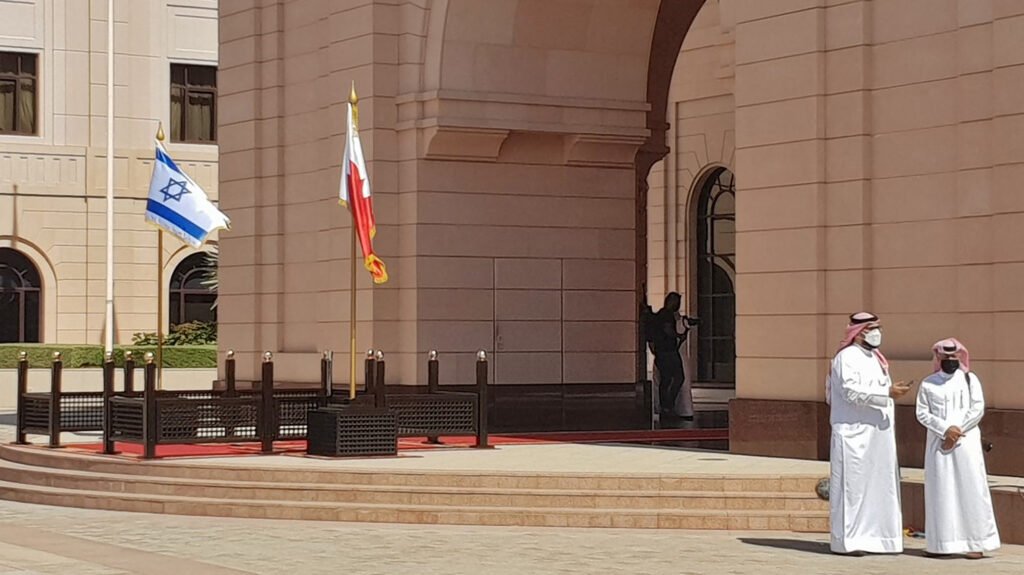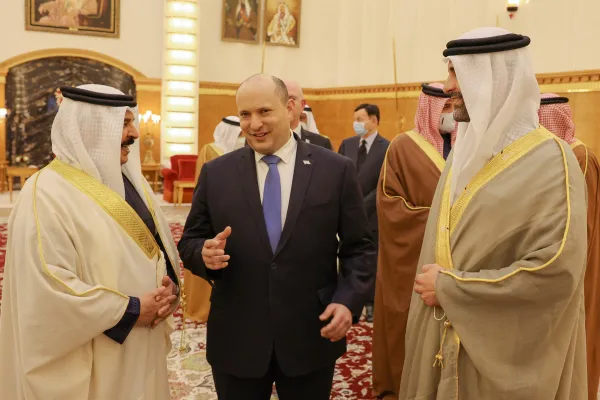•With Iran in mind, several Gulf countries are feeling out potential high-tech weapons deals with Israel after rapid sea-change in relations.
By Arie Egozi
A confluence of rapid global developments is quickly shifting Israel’s historically icy relationship with its Gulf neighbors, such that Israel is now considering the sale of high-tech defense articles to several Muslim-led nations.
“The reality in the Gulf region has changed dramatically, and that is an understatement,” said one senior Israeli defense analyst, who requested anonymity to discuss the sensitive subject. “What until some months ago looked like science fiction is now on the table.”
Beyond discussions about radars for the United Arab Emirates and missile defense systems for Saudi Arabia, a top Israeli defense official, Chief of General Staff Lt. Gen. Aviv Kohavi, flew to Bahrain last week to meet with security officials there, where he was welcomed by his Bahraini counterpart, Theyab bin Saqr al-Nuaimi. That followed a security cooperation agreement signed between the two countries in February.
Sources here said the Bahrainis, like others in the region, are interested in Israeli defense systems.
While in Bahrain, Kohavi also reportedly met with a top Qatar defense official. According to a Saudi-owned newspaper, the two discussed Iran-made drone worries and counter-drone systems. Sources said Kohavi went as far as proposing the use of Israeli-made radars to counter Iranian-made drones. The Israeli Ministry of Defense declined to comment for this report.
The lightning-fast change in relationships followed not just the signing of the Abraham Accords of 2020 (of which Qatar and Saudi Arabia are not parties), but three seismic global shifts over the last eight months: the post-Afghanistan partial withdrawing of the US from the Middle East, the potential finalizing of a new Iranian nuclear deal and, most recently, Russia’s brazen invasion of Ukraine.
RELATED: How the Ukraine situation could impact Israel’s strategies for Syria and Iran
“These countries with Sunni leadership or majority understand that cooperating with Israel is their insurance policy” against Shia-dominated Iran, said the senior analyst, who added their view that the Iran nuclear deal could lead to Iran becoming a nuclear power. As Ukraine faces Russia on its own militarily, and amid doubts about US intervention elsewhere, the Gulf nations are preparing themselves, quickly, to take on an Iranian threat, the Israeli sources said.

The flags of Israel and Bahrain are seen outside the al-Qudaibiya (Gudaibiya) palace in the Bahraini capital Manama, on February 15, 2022. (Photo by GUILLAUME LAVALLEE/AFP via Getty Images)
According to Uzi Rabi, an Israeli expert on the Middle East and the Gulf, the reported meeting with Qatar is emblematic of that country’s view that despite not having a formal relationship with Israel, it may need a de facto one.
“They are not part of any formal security agreement but understand the need to be fully coordinated with these new agreements,” Rabi told Breaking Defense.
The region’s interest in Israeli defense articles is so profound that sources say it could extend even to the latest version of Israel’s Merkava tank, which the IDF expects to receive in 2023. Sources said that tank comes with a high-tech “Iron Vision” situational awareness system as well as integration into air and ground defenses. However, it’s unclear how far discussions regarding the tanks have gotten.
“I think that the UAE and Bahrain should ask Israel to sell them advanced weapon systems — not necessarily tanks,” Giora Eiland, a retired IDF major general and former head of the Israeli National Security Council, told Breaking Defense. “They should go for Israeli ground-to-ground missiles and the best-in-the-world anti-tank missiles.”
The new talks come as Israel continues to perform a balancing act as it responds to the Russian invasion of Ukraine, mostly joining the world in condemnation but also trying to keep warm relations with Moscow in order to maintain a relative freehand in Russian-controlled airspace in Syria.
But the Gulf nations have been watching the invasion as well, Israeli sources said, and have come away with one painful lesson:
“They understand now more than ever that they will have to defend themselves and want to have the best tools to do so,” one source said.
Credit | Breaking Defence

